12 Tips for Baby and Toddler Dental Health
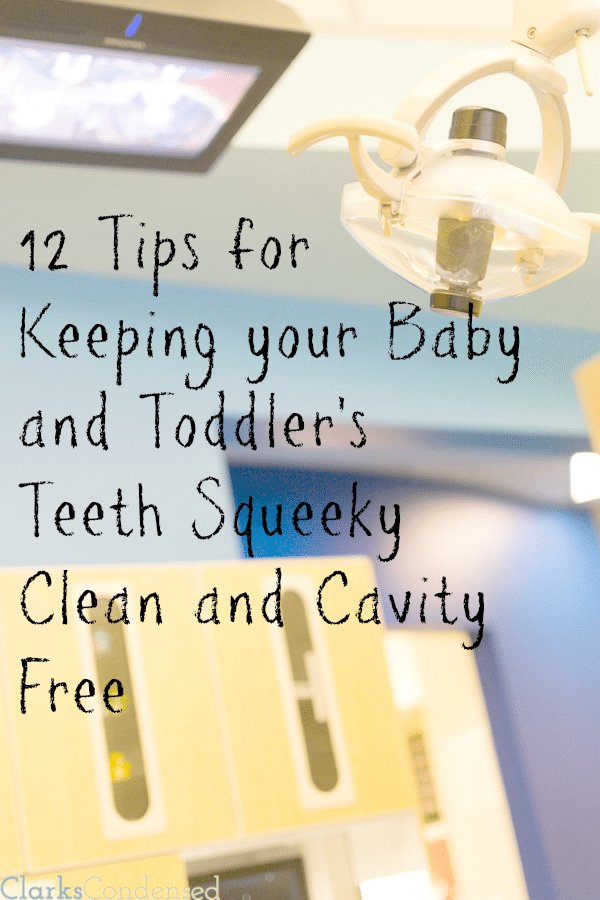
When I first started going to the dentist as a young child, my mom took me to their family doctor. I mean, why not? None of the other kids really had a problem going there, they took our insurance, and he was a family friend.
Apparently, I wasn’t about to let someone dig around in my mouth with dentist tools, so I bit him. And at that point, he forced recommended my parents take me to a pediatric dentist, and I think that was a wise decision. Although I still did not like going to the dentist, it really helped make it easier to go. The dentist and the dental assistants were always so kind and willing to go at a slow pace..plus, I always got a sweet toy afterward.
Back at the beginning of February, we took Jack to his first dentist appointment. Did you know that the earlier you go to the dentist, the better? It’s recommended to go as soon as their first teeth come in, or by the time they turn one. And, as you’ll find out in a moment, I wish we had gone earlier than we did.
We took Jack to a pediatric dentist in the Salt Lake area.
We were taken back pretty quickly to the room, and I was surprised that Jack, my normally timid of new situations boy, laid down on the dentist chair right away. I think it might have had to do with the fact that there was a movie playing on the ceiling…as you can see him watching in this picture:

The dental assistant was incredible! She took time to let Jack hold the tools, and went at a very slow pace. Jack only whimpered for me a few times, and let her clean his teeth with no struggle.
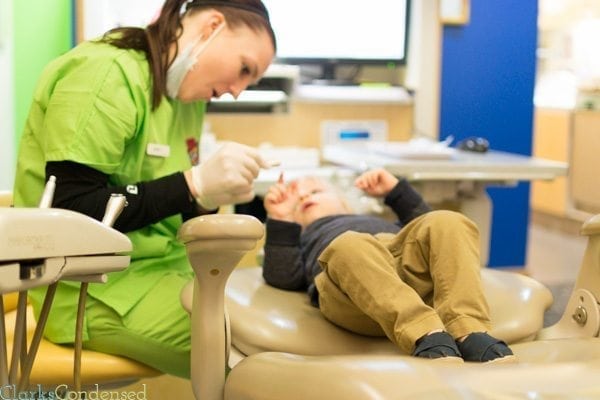
The dentist was great, too. He explained everything really thoroughly to us, which I appreciated, and didn’t act like we were terrible parents when he discovered that Jack’s two front teeth had some decay already. This was quite the shock to me, since he doesn’t drink juice, never has had a bottle, and we limit his sweets considerably. The dentist said it was most likely because a) there’s no fluoride in the water where we live and b) genes. I had a lot of cavities when I was younger, and continue to have dental issues.
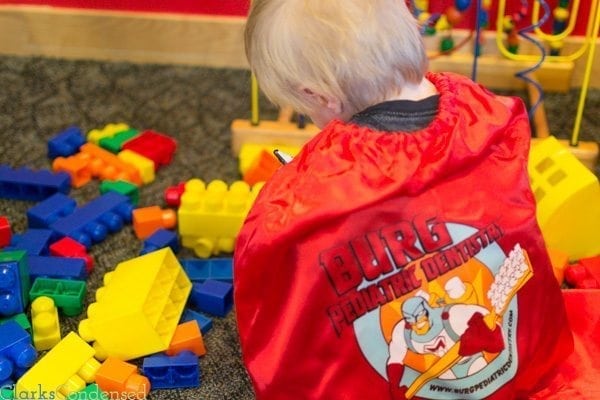
After we took Jack to Burg’s, we decided to be even more proactive about making sure he doesn’t get any more cavities. This led me to doing research on baby and toddler dental tips, and I thought I’d share that information with all of you!
1) Dental Care Starts Before Teeth Arrive
From the moment your baby is born, you should be concerned with their dental hygiene. Babies aren’t born with teeth (except in rare cases) but taking care of their gums is important. Gently massage their gums with an infant toothbrush (I’ve heard great things about the banana training toothbrush) or a soft washcloth. It’s important to brush the gums before teeth even come in.
2) When Teeth Come In
When teeth appear, brush twice daily with an infant toothbrush and training toothpaste (which doesn’t have fluoride – xylitol toothpaste is a great option.) Start flossing when two teeth touch each other. Even if your child resists, make sure you get those teeth cleaned as good as possible, especially before bedtime. Jack really loves to use children floss picks.
After your infant takes a bottle, gently wash off their teeth with a wet cloth, so the milk doesn’t stick to their teeth more. For older children, encourage them to drink water every time they eat something, which helps cleanse the teeth as well.
3) Visiting the Dentist
As I mentioned earlier, try to visit the dentist by the age of one. Some people think this is a silly recommendation (me included), but I wish we had. If he had gone in earlier, we could have been alerted to the fact that his teeth were more susceptible to cavities, and perhaps avoided having to put him under anesthesia and go through the process of putting fillings in.
4) Wean From Bottle by Age One
Jack had a bottle maybe twice his entire life, so this wasn’t something we had to worry about. However, baby bottle tooth decay is a real thing. It can be prevented (tips at the link provided), but it’s best to try and wean your child from their bottle by the age of one to prevent damage from occurring.
Some dentists will insist that a mother wean her baby from breastmilk. There’s a lot of debate on the subject, but I think this is a great article on whether or not breastfeeding is linked to tooth decay. Do your own research, but if your dentist says to wean for this reason solely, I would seek a second opinion.
5) Be Careful about Sippy Cup Choices
Even the sippy cup you use could contribute to tooth decay, particularly when they are drinking milk or juice (with water, it really doesn’t matter.) No-spill cups are popular for obvious reasons, but the valves make it so your child can’t sip from the cup. They end up sucking the liquid, much like from a bottle, which can cause similar issues to bottle decay. So, even they may cause more messes, try and avoid giving your child milk or fruit juice in the no-spill cups, and opt for ones like these take-and-toss kind. These are less expensive anyways!
I have heard AMAZING things about the Munchkin 360 Miracle cups. There’s no sippy top, supports normal mouth muscle development, and were created to help prevent dental issues. I’m definitely ordering some soon.
6) Water instead of Juice
When given a choice, what kid isn’t going to pick juice over water? Although it’s been hard having to limit a lot of Jack’s foods, it’s been worth it, because we had good reason to not give him juice, and convince other people not to give him juice either. However, too much juice can cause teeth to decay faster, so limiting this early on is a smart idea. When you do give your child juice, dilute it with water.
7) Signs of Decay
Decay can be hard to spot, especially on baby and toddler teeth, because they often won’t let you look too far into their mouths! However, if you start to notice white spots, or that they have a sensitivity to cold or sweets, this made indicate decay is starting, or already has. 0
9) When to Start Using Fluoride Toothpaste
Fluoride is an interesting thing. It has a lot of benefits, but you can definitely use too much. With toothpaste, when you spit it out, you don’t get a lot of the fluoride going into your body, but when a child or baby who can’t spit out the toothpaste yet, you don’t know how much they are getting. So as a general rule of thumb, don’t use toothpaste with fluoride until they can spit it into the sink. Instead, use a children’s xylitol toothpaste.
If your area doesn’t have fluoride naturally in the water (like our town), then be sure to get some fluoride drops from your doctor or county health building (it is typically by prescription only.)
10) Cut Food Up
This is one tip Jack’s dentist gave him — cut up his food into smaller pieces. That way, he’s using more of his back teeth (which are stronger, in general) rather than his front teeth. FunBites food cutters can help make this easier with certain foods.
11) Foods that are good for teeth
Cheese, sweet potatoes, oranges cranberries, apples, water
12) Foods that are bad for teeth
Sweets and sugar, juice, white foods (white bread, rice, potatoes, white pasta, crackers (can be as bad as candy for the teeth), fruit snacks, and raisins.

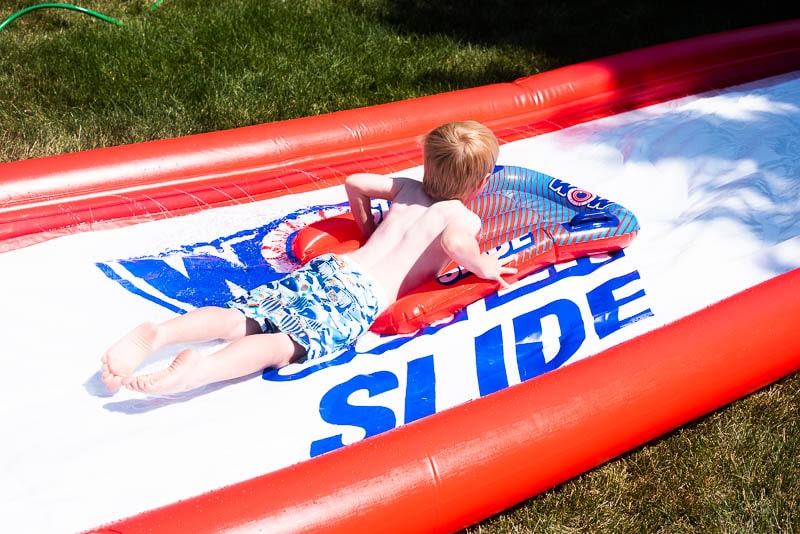
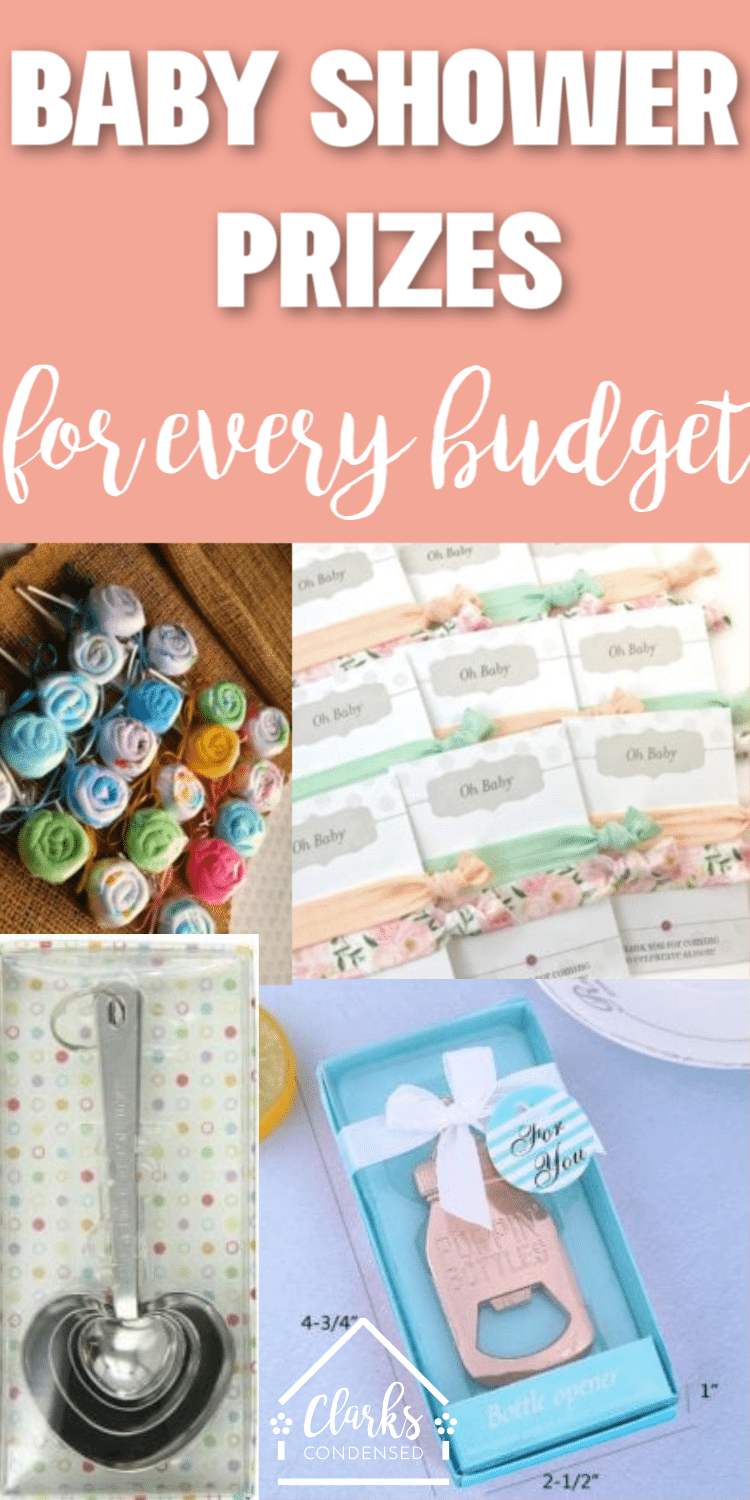
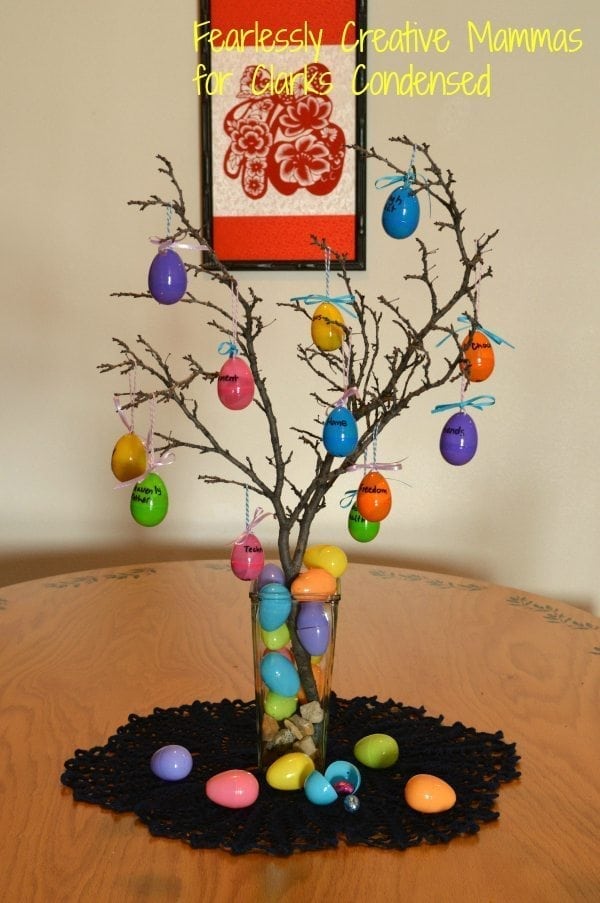
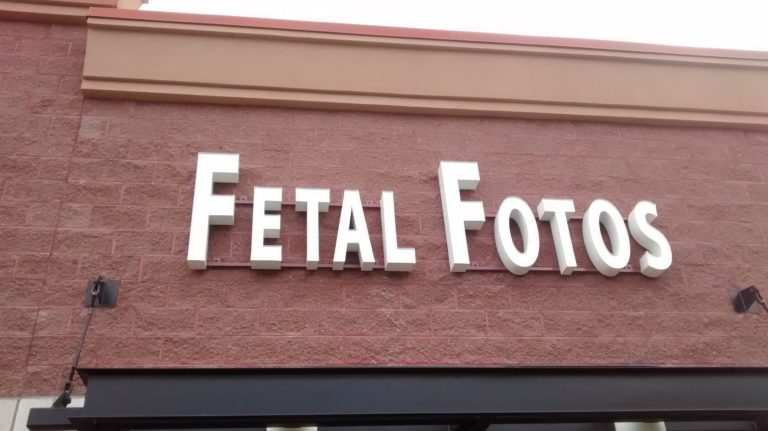

Very Effective tips thanks for
All the mom should tell their babies that brushing teeth is a fun game. In this way, babies will make it habit and will never forget to do it.Thanks for sharing helpful post.
I never considered how the valves on sippy cups could contribute to tooth decay. My child is almost a year old and has started using sippy cups. We’ll be sure to check whether or not we got her the right ones so that we can keep her teeth clean.
Very nice, thanks for sharing tips!
I wanted to thank you for explaining to me how to keep my toddler’s teeth healthy! For the longest time, I was unfamiliar with when I should let my kid use fluoride toothpaste, but now I know that I should let them use it when they can spit into the sink. My wife is pregnant with our second child, and so I want to make sure that I help my kids develop good oral hygiene. Thanks again for the help, and I will make sure that I am a good example!
I agree Katie! Every child is different
Thanks for the helpful tips!
I had no clue that decay could happen so early on. And I’m glad to hear your dentists were very understanding too, that’s such an important quality for your dental care provider to have. Thanks for sharing!
Great tips! Thanks for sharing. Its really hard to monitor your child’s teeth I agree that going to the dentist regularly will be a good help.
I agree that age one seems to be a bit young to take your kids to the dentist but it makes sense that if they have teeth coming in then they need to have it taken cared of. My sister started taking her daughter to get her teeth looked at when they noticed there was some decay coming in. I will be sharing these baby and toddler teeth health tips with my sister.
Actually there is not exact set date when the baby’s first tooth will arrive and every child is somehow different from one another. The parents just need to take comfort in the fact that the first few teeth are worst.
Yes, every child is different!
Wonderful post! I have one suggestion as a dental hygienist. I agree with no fluoride till the child can spit it out. I suggest you look into xylitol toothpaste till you get to that point. It helps protect the teeth from the bacteria that causes tooth decay and helps reminders lie the teeth as long as decay is no u through the enamel.
Thank you for the suggestion!
I just wanted to add….you do NOT need to clean the teeth after nursing breast milk. It naturally will not decay the teeth. BUT-you have to clean the teeth before that last nursing. If baby eats solids, the sugars from that food will manifest w/ the breast milk.
You are absolutely correct, thank you for sharing! I have learned a lot about breastmilk/feeding since I wrote this post, and I plan to do an update soon, because there’s a lot of incorrect (and unfortunate) information out there about breastfeeding and tooth decay!
Soft teeth is actually a myth. Did your boys two front teeth come really close together instead of a large space in between? The other factor that could be why he developed caries is that he contracted cavity causing bacteria like s. Mutans from a caregiver. If you kiss, share spoons, lick their pacifiers, drink from the same straw you can pass it to your children, it is a transmittable bacteria.
Sincerely, Registered Dental Hygienist in CA
Thanks for the information! It’s always great to get other insight. They weren’t particularly close together. Who knows!
I believe that it is actually recommended to use toothpaste with fluoride, just a very small amount of it (size of a grain of rice), right from the first teeth. Another piece of advice that I got from another mom that I really liked was to use minty toothpaste from the beginning, instead of fruity or sweet kinds, so that they get used to it and don’t want to eat it!
That is a great tip! I didn’t even think to try that.
The flouride thing seems to vary. When we lived in Utah, they recommended we get a prescription from it from the beginning. However, when we moved to Colorado, the pediatrician and dentist both said not to until after 4. I think we may have flouride in our water here, but not in Utah. Thanks for commenting!
These are all great points! One important piece of info…There has recently been a significant rise is child cavities. One NEW change made in the last couple of years by the American Academy of Pediatric Dentistry is a recommendation to use a small smear of FLUORIDE toothpaste for any child under 3 with even one tooth. after the age of 3, it can be a pea size amount. The smear of paste is enough to be incorporated into the enamel, but not enough to cause ill effects if swallowed. The excess is simply excreted by the body. Please let everyone know, the new recommendation can prevent cavities, which may require invasive procedures to repair, sometimes even hospitalization, or painful infections if left untreated. My child has had fluoride toothpaste since day one, we use Tom’s of Maine children’s with fl. I am a dental hygienist from Texas and I struggle with my toddler over brushing, as most parents I talk to do. The fluoride will help prevent decay, but at 2 years, the damage may already be done for many little ones. you can read about the new recommendation on the AAPD website!
Thank you so much for the recommendation!
Appreciate your efforts to help educate others, but please remove cranberries as a beneficial food for teeth. The reason being that they are concentrated and sticky on the teeth, hence likely to encourage decay.
Julie Rechtin, RDH licensed in Florida & Georgia
Also mother to 7 month old Eric 🙂
Thanks for your concern and comment!
Katie, very well said. Just an addendum, dental hygienists clean teeth. They are board certified Registered dental hygienists and what that means is they have to have a minimum of 2 years of training, take 2 boards, & they require a license to practice. Assistants do NOT have to have any formal training in order to assistance the dentist. Thank you
Thanks for the clarifications!
Decay on children’s teeth can happen! Make sure to visit your dentist.
Number 4 is so true. Many parents let their child stay on the bottle long beyond their 1st birthday.
Its really nice, They treat every kid special there and like they are a super hero great.. Thank you for sharing..
You’re welcome! And I agree — they do treat every kid like a super hero. I love it!
Always welcome my dear friend Katie..
This Burg Pediatrics Dentistry looks like such a nice place! I wish my first dentist experience was something like that.
Very nice post, Thank you so much for sharing this information with us…
Thanks for stopping by! I’m glad you found it interesting.
Thank you for these helpful tips, especially for the new mom’s. Your child’s first or primary teeth are as important as permanent teeth and needs daily care. It’s a good thing that Jack had a positive dental experience to set him up for a lifetime of great oral health care and stress-free dental visits in the future. I can see that the dental office is fun and inviting to the children which is really helpful in making them feel comfortable. Genuine care and the overall environment of the dental office are very important to calm the nerves of young patients.
You are so very welcome! I think a lot of people just don’t really think about taking care of their child’s gums or first teeth until it is too late. I agree about the environment being very important for a child’s visit to the dentist — we sure are grateful we were able to go to such a great dentist!